| Listing 1 - 10 of 33 | << page >> |
Sort by
|
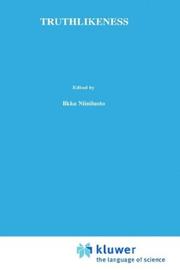
ISBN: 9027723540 9401081700 9400937393 Year: 1987 Publisher: Dordrecht
Abstract | Keywords | Export | Availability | Bookmark
 Loading...
Loading...Choose an application
- Reference Manager
- EndNote
- RefWorks (Direct export to RefWorks)
Theory of knowledge --- Logic --- Truth --- Conviction --- Belief and doubt --- Philosophy --- Skepticism --- Certainty --- Necessity (Philosophy) --- Pragmatism --- Argumentation --- Deduction (Logic) --- Deductive logic --- Dialectic (Logic) --- Logic, Deductive --- Intellect --- Psychology --- Science --- Reasoning --- Thought and thinking --- Methodology
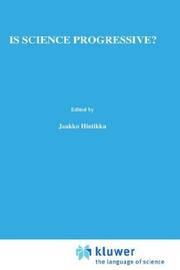
ISBN: 9027718350 9048184045 9401719780 9789027718358 Year: 1984 Volume: 177 Publisher: Dordrecht Reidel
Abstract | Keywords | Export | Availability | Bookmark
 Loading...
Loading...Choose an application
- Reference Manager
- EndNote
- RefWorks (Direct export to RefWorks)
Philosophy of science --- Science --- Realism --- Philosophy --- 165 --- -Natural science --- Science of science --- Sciences --- Empiricism --- Universals (Philosophy) --- Conceptualism --- Dualism --- Idealism --- Materialism --- Nominalism --- Positivism --- Rationalism --- Kennisleer. Epistemologie --- Realism. --- Philosophy. --- -Kennisleer. Epistemologie --- 165 Kennisleer. Epistemologie --- -165 Kennisleer. Epistemologie --- Natural science --- Normal science --- Realisme. (Versch. onderwerpen) --- Sciences. Philosophie. (Mélanges) --- Réalisme. (Mélanges) --- Wetenschap. Filosofie. (Versch. onderwerpen) --- Science - Philosophy
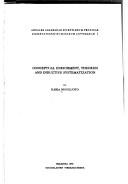
ISBN: 9514101472 9789514101472 Year: 1973 Publisher: Helsinki Suomalainen Tiedeakatemia
Abstract | Keywords | Export | Availability | Bookmark
 Loading...
Loading...Choose an application
- Reference Manager
- EndNote
- RefWorks (Direct export to RefWorks)
Induction (Logic) --- Concepts --- Science --- -Natural science --- Science of science --- Sciences --- Concept formation --- Abstraction --- Knowledge, Theory of --- Perception --- Psychology --- Inductive logic --- Logic, Inductive --- Logic --- Reasoning --- Philosophy --- Concepts. --- Philosophy. --- -Philosophy --- Induction (Logic). --- Normal science --- Philosophy of science
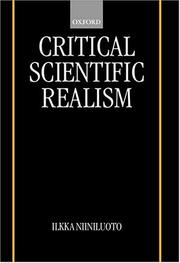
ISBN: 0198238339 9780198238331 Year: 1999 Publisher: Oxford Oxford University Press
Abstract | Keywords | Export | Availability | Bookmark
 Loading...
Loading...Choose an application
- Reference Manager
- EndNote
- RefWorks (Direct export to RefWorks)
Realism. --- Science --- Philosophy. --- Theory of knowledge --- Realism --- -Empiricism --- Philosophy --- Universals (Philosophy) --- Conceptualism --- Dualism --- Idealism --- Materialism --- Nominalism --- Positivism --- Rationalism --- Natural science --- Science of science --- Sciences --- Normal science --- Philosophy of science --- Empiricism --- Science - Philosophy.
Book
ISBN: 3319991574 3319991566 Year: 2018 Publisher: Cham : Springer International Publishing : Imprint: Springer,
Abstract | Keywords | Export | Availability | Bookmark
 Loading...
Loading...Choose an application
- Reference Manager
- EndNote
- RefWorks (Direct export to RefWorks)
This book examines the philosophical conception of abductive reasoning as developed by Charles S. Peirce, the founder of American pragmatism. It explores the historical and systematic connections of Peirce's original ideas and debates about their interpretations. Abduction is understood in a broad sense which covers the discovery and pursuit of hypotheses and inference to the best explanation. The analysis presents fresh insights into this notion of reasoning, which derives from effects to causes or from surprising observations to explanatory theories. The author outlines some logical and AI approaches to abduction as well as studies various kinds of inverse problems in astronomy, physics, medicine, biology, and human sciences to provide examples of retroductions and abductions. The discussion covers also everyday examples with the implication of this notion in detective stories, one of Peirce’s own favorite themes. The author uses Bayesian probabilities to argue that explanatory abduction is a method of confirmation. He uses his own account of truth approximation to reformulate abduction as inference which leads to the truthlikeness of its conclusion. This allows a powerful abductive defense of scientific realism. This up-to-date survey and defense of the Peircean view of abduction may very well help researchers, students, and philosophers better understand the logic of truth-seeking.
Abduction (Logic) --- Logic --- Reasoning --- Syllogism --- Genetic epistemology. --- Logic, Symbolic and mathematical. --- Logic. --- Science --- Normal science --- Philosophy of science --- Argumentation --- Deduction (Logic) --- Deductive logic --- Dialectic (Logic) --- Logic, Deductive --- Intellect --- Philosophy --- Psychology --- Thought and thinking --- Algebra of logic --- Logic, Universal --- Mathematical logic --- Symbolic and mathematical logic --- Symbolic logic --- Mathematics --- Algebra, Abstract --- Metamathematics --- Set theory --- Developmental psychology --- Knowledge, Theory of --- Philosophy. --- Methodology --- Epistemology. --- Theoretical Linguistics. --- Mathematical Logic and Foundations. --- Philosophy of Science. --- Linguistics. --- Mathematical logic. --- Philosophy and science. --- Science and philosophy --- Linguistic science --- Science of language --- Language and languages --- Epistemology --- Theory of knowledge

ISBN: 1281970484 9786611970482 0191519405 9780191519406 9780191598098 0191598097 9781281970480 6611970487 0198238339 0199251614 9780198238331 9780199251612 Year: 1999 Publisher: Oxford ; New York : Oxford University Press,
Abstract | Keywords | Export | Availability | Bookmark
 Loading...
Loading...Choose an application
- Reference Manager
- EndNote
- RefWorks (Direct export to RefWorks)
Ilkka Niiniluoto comes to the rescue of realism in the philosophy of science. Philosophical realism holds that the aim of a particular discourse is to make true statements about its subject-matter. Niiniluoto surveys different kinds of realism in various areas of philosophy, then sets out his own critical realist philosophy of science, characterizing scientific progress in terms of increasing truthlikeness, and defends this theory against its rivals.
Realism. --- Science --- Normal science --- Philosophy of science --- Empiricism --- Philosophy --- Universals (Philosophy) --- Conceptualism --- Dualism --- Idealism --- Materialism --- Nominalism --- Positivism --- Rationalism --- Philosophy.
Digital
ISBN: 9783319991573 Year: 2018 Publisher: Cham Springer International Publishing
Abstract | Keywords | Export | Availability | Bookmark
 Loading...
Loading...Choose an application
- Reference Manager
- EndNote
- RefWorks (Direct export to RefWorks)
This book examines the philosophical conception of abductive reasoning as developed by Charles S. Peirce, the founder of American pragmatism. It explores the historical and systematic connections of Peirce's original ideas and debates about their interpretations. Abduction is understood in a broad sense which covers the discovery and pursuit of hypotheses and inference to the best explanation. The analysis presents fresh insights into this notion of reasoning, which derives from effects to causes or from surprising observations to explanatory theories. The author outlines some logical and AI approaches to abduction as well as studies various kinds of inverse problems in astronomy, physics, medicine, biology, and human sciences to provide examples of retroductions and abductions. The discussion covers also everyday examples with the implication of this notion in detective stories, one of Peirce’s own favorite themes. The author uses Bayesian probabilities to argue that explanatory abduction is a method of confirmation. He uses his own account of truth approximation to reformulate abduction as inference which leads to the truthlikeness of its conclusion. This allows a powerful abductive defense of scientific realism. This up-to-date survey and defense of the Peircean view of abduction may very well help researchers, students, and philosophers better understand the logic of truth-seeking.
Mathematical logic --- Theory of knowledge --- Philosophy of science --- Logic --- Linguistics --- Bayesian statistics --- epistomologie --- linguïstiek --- wetenschapsfilosofie --- kennisleer --- wiskunde --- logica
Book
Year: 1973
Abstract | Keywords | Export | Availability | Bookmark
 Loading...
Loading...Choose an application
- Reference Manager
- EndNote
- RefWorks (Direct export to RefWorks)
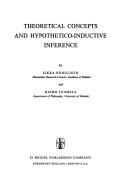
ISBN: 9027703434 9401025983 9401025967 Year: 1973 Publisher: Dordrecht Reidel
Abstract | Keywords | Export | Availability | Bookmark
 Loading...
Loading...Choose an application
- Reference Manager
- EndNote
- RefWorks (Direct export to RefWorks)
Philosophy of science --- Induction (Logic) --- Inference --- Ampliative induction --- Induction, Ampliative --- Inference (Logic) --- Reasoning --- Inductive logic --- Logic, Inductive --- Logic --- Hintikka, Jaakko --- Hintikka, Jaakko,
Book
ISBN: 9519505482 9789519505480 Year: 1982 Volume: 35 Publisher: Societas philosophica fennica,
Abstract | Keywords | Export | Availability | Bookmark
 Loading...
Loading...Choose an application
- Reference Manager
- EndNote
- RefWorks (Direct export to RefWorks)
| Listing 1 - 10 of 33 | << page >> |
Sort by
|

 Search
Search Feedback
Feedback About UniCat
About UniCat  Help
Help News
News